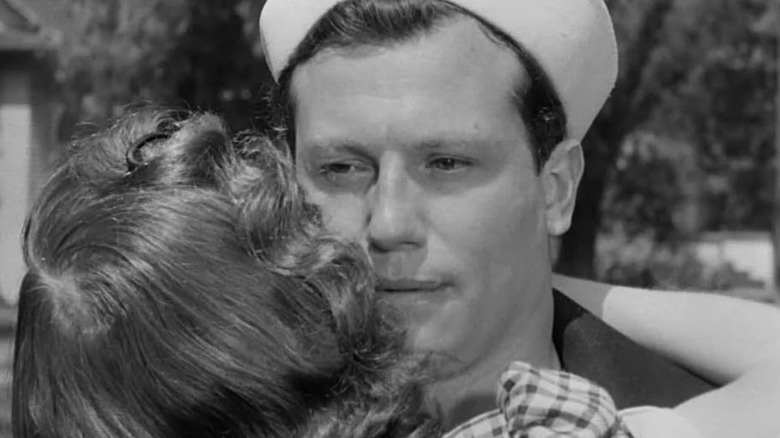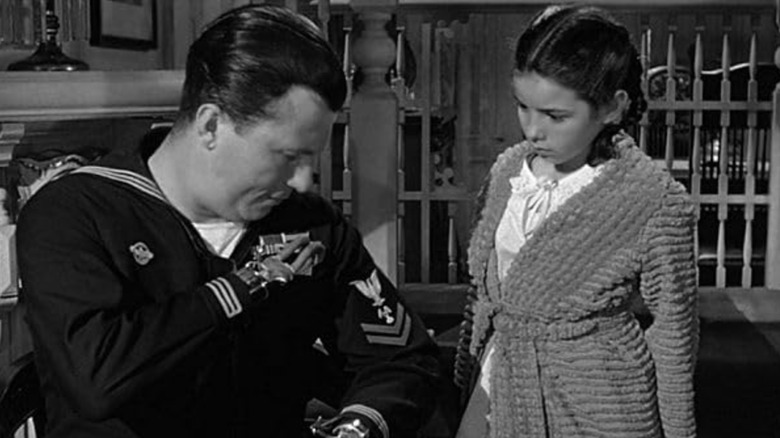The Only Actor To Win Two Oscars For The Same Performance
If there's one thing the Oscars love, it's a big moment. The envelopes containing the winners of the most prestigious film awards in Hollywood may be sealed, but that doesn't stop the powers-that-be behind each year's Oscars telecast from setting the night up for maximum surprise, drama, and inspiration. It doesn't always work, like when, at the 93rd Oscars, the categories were rearranged so the telecast could end with Chadwick Boseman's posthumous Best Actor win (or so many presumed, although producer Stephen Soderbergh denied this). Except Boseman didn't win, and category winner Anthony Hopkins wasn't at the ceremony, so the seemingly pre-planned big finish turned out to be an awkward dud.
Now and again, though, the Academy's penchant for trying to plan around potential wins results in some happy accidents. Such was the case in 1947, when Harold Russell made history as the first non-professional actor to win an Oscar — and the only actor to ever take home two statuettes for the same role — for his turn in "The Best Years of Our Lives" (per The Guardian).
Russell's casting in William Wyler's post-war drama, itself that year's Best Picture Oscar winner, was an early case of a disabled actor playing a disabled role, as the young World War II veteran lost both hands during a training accident. His on-screen character, Homer Parrish, was a star athlete who had also had both hands amputated during the war, and who feared his relationship with his fiancee would be ruined by the metal hooks he'd been given in their place.
Harold Russell won an honorary award in 1947
"The Best Years of Our Lives" is often regarded as one of the most sensitively told on-screen portrayals of PTSD and the after-effects of war in America. It earned a then-staggering amount of money at the box office and nearly swept the Oscars, winning seven of the eight categories for which it was nominated. Journalist Kristen Lopez, whose work focuses on disability on screen, once called the movie "one of the best portrayals of disability I can recommend." When the Library of Congress began adding the most culturally and historically important American movies ever made to its archive in the late '80s, "The Best Years of Our Lives" was one of the very first batch chosen.
Despite all this, it seems like Russell wasn't expected to win his Best Supporting Actor category. He wasn't a professional actor, but had been scouted for the film by Wyler after appearing in a short government-made documentary titled "Diary of a Sergeant." As a first time actor, it seemed likely that Russell wouldn't beat out industry veterans like Claude Rains, Clifton Webb, and Charles Coburn, all of whom had been nominated for Oscars before 1946. Still, his turn in the movie was remarkable, and the Academy obviously wanted to recognize it somehow. Thus, they gave Russell a special Oscar, presented to him by Shirley Temple for "bringing hope and courage to his fellow veterans" (per the LA Times).
Later that night, Russell defied expectations by winning Best Supporting Actor after all, making history at the 19th Academy Awards for his unprecedented double win. Unfortunately, the exposure didn't lead to a Hollywood career for Russell, as The Guardian noted that Wyler told him to return to college instead of pursuing acting "because there wasn't much call for a guy with no hands in the motion picture industry." The Oscar winner fought ableism in other ways, serving on a committee for the employment of disabled people under several different presidential administrations. He passed away in 2002, but his memory lives on in "The Best Years of Our Lives," in his historic Oscar moment, and in his work on behalf of disabled people everywhere.

